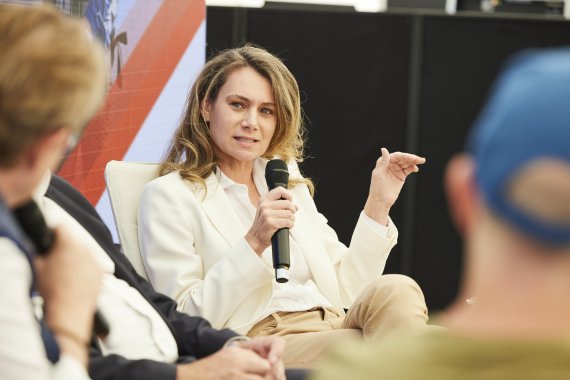
No healthy society without sports. School sports counteract obesity from an early age and create an appetite for exercise. Sports programs such as fitness studios and sports clubs provide a physical and mental balance and prevent lifestyle diseases.
But when it comes to political decisions, sports have often been left on the sidelines: In Germany, almost every fourth hour of physical education at school is cancelled. Fitness studios, sports clubs or ski resorts had to close for months despite elaborated hygiene concepts in Europe and struggled for their economic survival.
"In Germany, the too-quiet outdoor sports lobby was a weak point in the corona pandemic," criticized Prof. Dr. Manuel Sand from the Adventure Campus Treuchtlingen in an ISPO.com interview.
But how can associations and labels give sport the voice that does justice to its social role? How can lobbying for good succeed in creating legal framework conditions for a healthy society, sustainability and fair working conditions? Laura Santucci should know.
The U.S. citizen was once a campaign advisor to Barack Obama during his presidential campaign and worked as a Assistant to the Obama administration in the White House. She also worked for the United Nations World Food Programme in Rome. As part of the Outdoor Conference, she gave unique insights at OutDoor by ISPO 2022 into successful lobbying - for good!
Her most important principle: "If you're not at the table, you're on the menu." To ensure the sport has its place at the negotiating table, Santucci, who successfully represented the interests of nursing and hospital staff before her Obama stint, recommends working on two fronts: "You need to have an inside and outside game."

The "inside game" is meetings with political decision-makers in parliaments, ministries or commissions, for example. The task here: Network and sound out interests. "What motivates the individual legislators? You don't find that out by having a nice position paper. You have to make contacts and get into the backyards. Having discretion is really important here." This is not the way to win a beauty prize, "but you’re winning for your industry".
The principle of "the more powerful, the better" does not automatically apply, according to Dr. Martin Frick of the United Nations World Food Programme, who was also a speaker at the Outdoor Conference: "Access to higher level does not necessarily mean more power." Thus, he said, calls from the German sports industry for a newly established Ministry of Sport as a point of contact are not a panacea. Rather, lobbying at the local and state level could open doors with a much smaller lever.
The "outside game" consists of PR work: whether in advertising campaigns, social media, interviews or commissioned studies. Here, the sports industry can set its own topics and thus enrich and help steer the social debate. Dr. Frick encourages the sports and outdoor industry to become even more active here. "You are not just selling caps, sneakers, bikes or tents. You are selling an identity and a lifestyle that is connected to your brands. The people who are watching your ads are the very same that vote."
For example, outdoor brands can continue to push the issue of sustainability. "Don’t underestimate of the power of perception! It has a much greater influence than any UN program could ever have," Frick said. The oil industry, for example, has influenced the public debate on climate change in its favor for decades with multi-million dollar campaigns and continues to provide climate change skeptics with argumentative ammunition with its studies.

When it comes to PR strategy, Santucci says it's also worth looking outside the box at success stories in other industries. How, for example, did she win higher wages and better working conditions for hospital staff? "We advocated and lobbied. We partnered with hospital CEOs. We connected the dots between quality care with the quality of working conditions." And what politician would want to voluntarily wave through a lower quality of care?
A joint initiative as an industry is also important, according to Dr. Frick. The Paris Agreement on climate change, for example, has provided a framework for measurability despite the threat of missing its targets, he said. "It is important to set an ideal to make people aspire for that idea, like the Paris agreement. We are putting stars in the night sky that give you orientation."
In the face of teetering supply chains, resource scarcity and climate change, that orientation is more important than ever. If there's one thing the sports industry can't afford, according to Laura Santucci, it's inaction: "As volatile as world politics currently are, it is all the more important that people on the sidelines speak up and get involved."
So that sport doesn't lose out again when the next political decision is made - and society with it.

 Sports BusinessMental Health Awareness Month: A global appeal
Sports BusinessMental Health Awareness Month: A global appeal
- Awards
- Mountain sports
- Bike
- Fitness
- Health
- ISPO Munich
- Running
- Brands
- Sustainability
- Olympia
- OutDoor
- Promotion
- Sports Business
- Textrends
- Triathlon
- Water sports
- Winter sports
- eSports
- SportsTech
- OutDoor by ISPO
- Heroes
- Transformation
- Sport Fashion
- Urban Culture
- Challenges of a CEO
- Trade fairs
- Sports
- Find the Balance
- Product reviews
- Newsletter Exclusive Area
- Magazine





